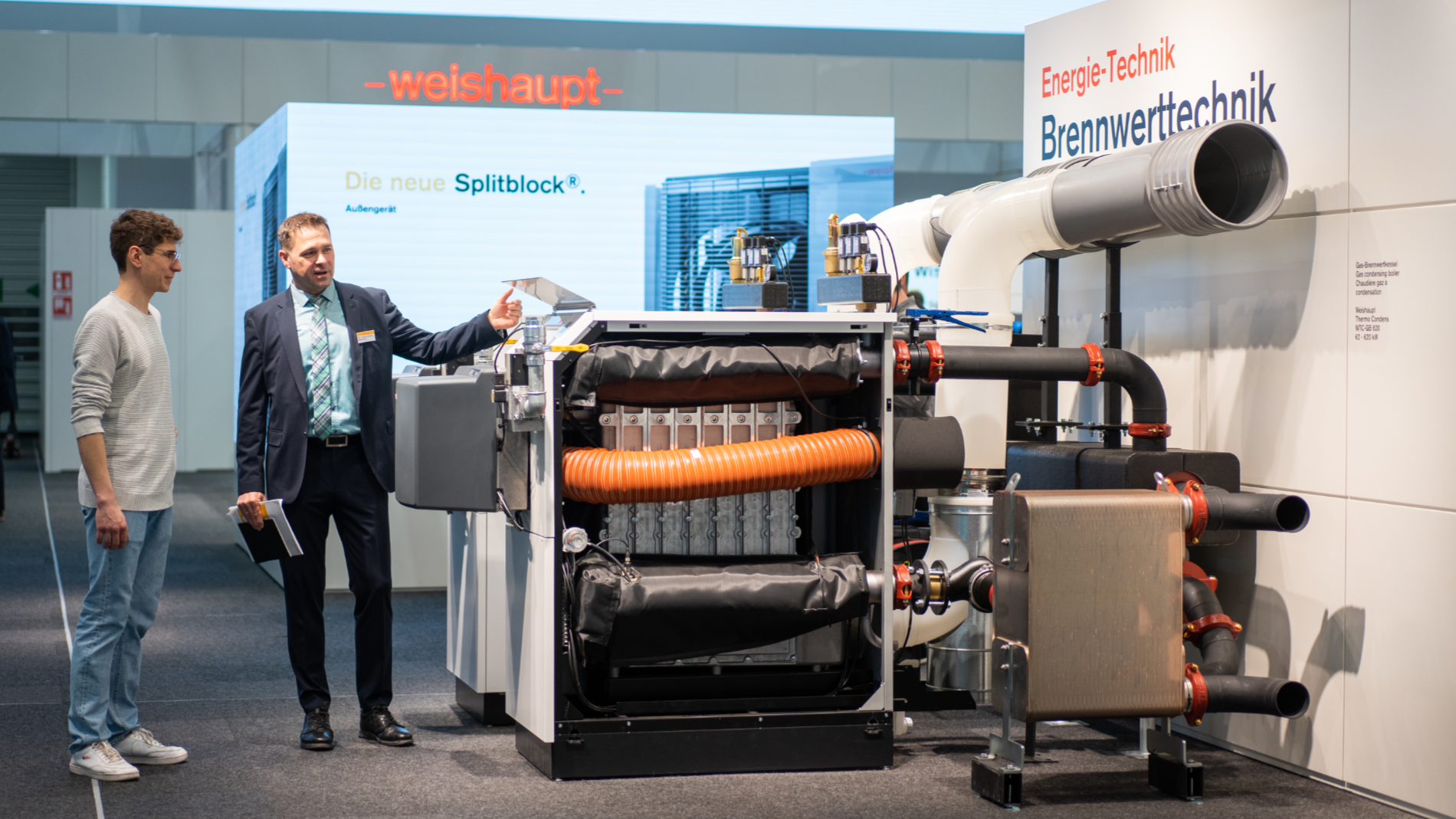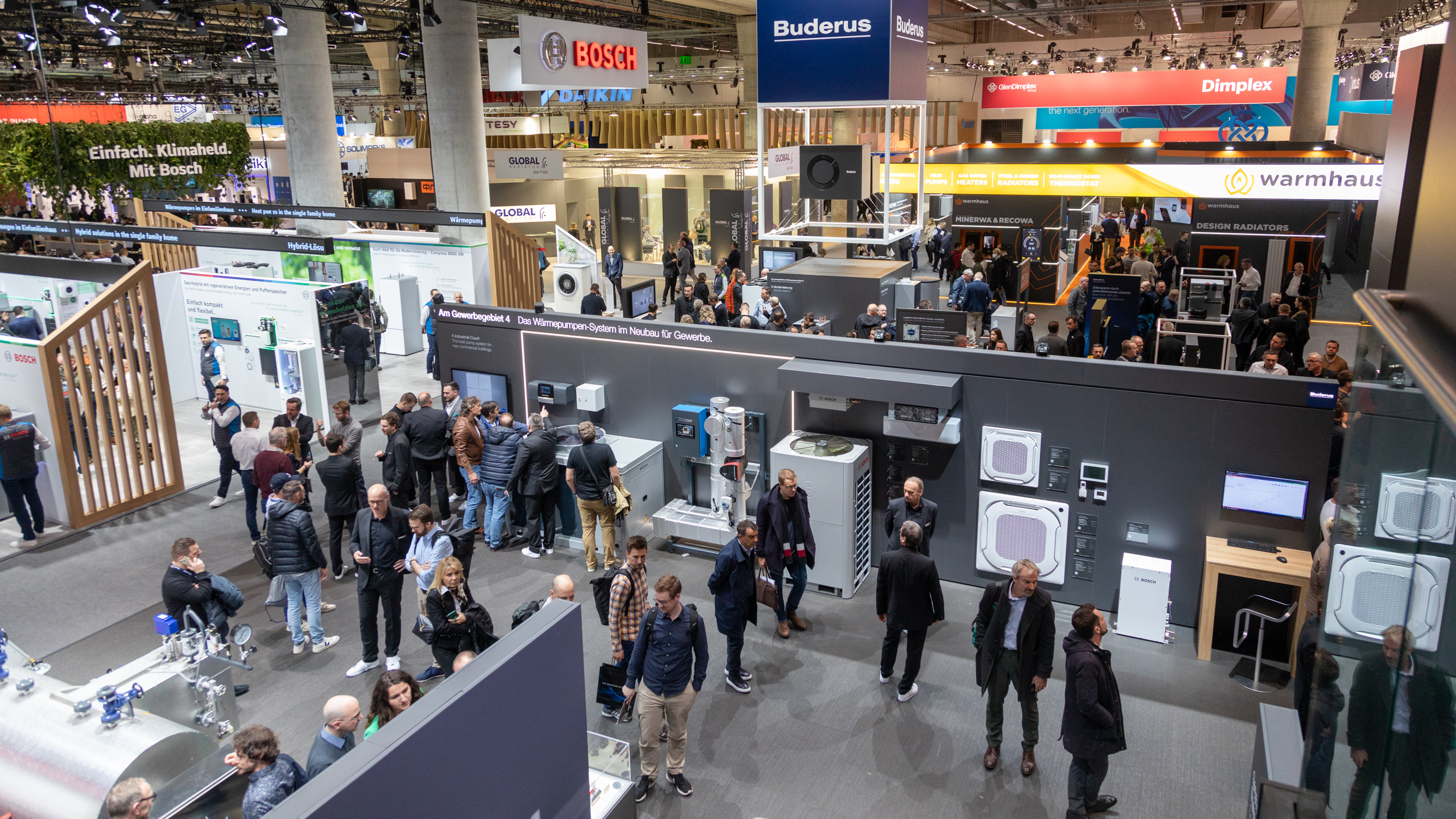Heating with gas, hydrogen and e-fuels

Thanks to breakthroughs in environmentally-friendly fuels and improved energy efficiency, gas and liquid-based heating systems are now significantly more sustainable than their reputation would suggest. The modernisation of oil and gas heating systems is an important lever for reducing heating costs and CO2 emissions. CHP units, fuel cells and innovative hydrogen technologies are expanding the range of solutions for climate-friendly heating based on gas and liquids.
At the world's leading trade fair for the sector, the ISH, visitors can see the latest innovations for themselves and discover how hydrogen heating systems, combined heat and power plants (CHP), green fuels and e-fuels are making heating systems fit for the future.
Gas condensing technology: efficiency and climate protection in one
Gas-fired condensing boilers are among the most efficient heating systems on the market. Thanks to waste heat utilisation, modern condensing boilers achieve efficiency levels of up to 98 percent, resulting in energy savings of around 30 percent compared to older gas boilers.
By generating electricity and heat from organic waste, biogas plants provide a climate-friendly alternative to fossil natural gas. Replacing natural gas with biogas in condensing boilers can reduce CO2 emissions by up to 90 percent.
Hydrogen and fuel-cell heating systems: gas-based heating systems for the future
Hydrogen-based heating systems open up the prospect of climate-neutral heating if the electrolysers are powered by renewable sources of energy. Today's gas-fired condensing boilers can already operate with a blend of up to 20 percent hydrogen. The first hydrogen-ready appliances that can be converted to run 100 percent on hydrogen have already reached the prototype stage.
Fuel-cell heating systems use hydrogen to generate electricity and heat. To do this, natural gas fuel-cell heating systems convert natural gas into hydrogen and, thanks to the combination of heat and electricity generation, efficiency levels of up to 90 percent are possible.
Green fuels and e-fuels: climate-friendly alternatives to heating oil
Liquid-based heating systems are becoming increasingly sustainable thanks to alternative liquid fuels. Synthetic fuels, also known as green fuels or e-fuels, can be used in existing oil-fired condensing boilers and reduce their CO2 emissions by up to 90 percent. Initial pilot projects show that, when combined with efficient condensing boilers, renewable liquid fuels can already be used to generate heat in a climate-neutral way.
Combined heating systems: synergies with gas, liquids and renewables
Hybrid solutions can be used to tap the full environmental potential of gas and liquid-based heating systems. Gas hybrid heating systems combine gas condensing technology with renewable sources of energy, such as photovoltaics or solar thermal energy. Intelligent control systems adapt heating operations in line with the availability of renewable energies, to maximise the proportion of green energy.
Oil condensing heating systems using green fuels are also well suited for combining with solar thermal systems or heat pumps to further increase efficiency and sustainability.
Combined heat and power plants (CHP): decentralised heat provision
Another tried and tested option in the field of gas and liquid-based heating systems is combined heat and power (CHP) plants. These mini power plants use fuel cell technology to generate electricity and heat simultaneously by burning natural gas, biogas or hydrogen. Thanks to decentralised, demand-oriented energy generation, CHP plants can achieve overall efficiency levels of over 90 percent.
If combined with a heat storage system, CHP units work well with renewable energies such as photovoltaics or wind power. In particular, the use of green hydrogen as a fuel smooths the way to the climate-neutral provision of heat.
Modern gas and liquid-based heating systems are an important step towards decarbonising our heating systems. By using renewable sources of energy, such as hydrogen, green fuels or e-fuels, these systems can reduce our dependence on fossil fuels and make an important contribution to the heating transition. Take this opportunity to discover for yourself the latest developments at the ISH trade fair and find the perfect way to modernise your heating system.
